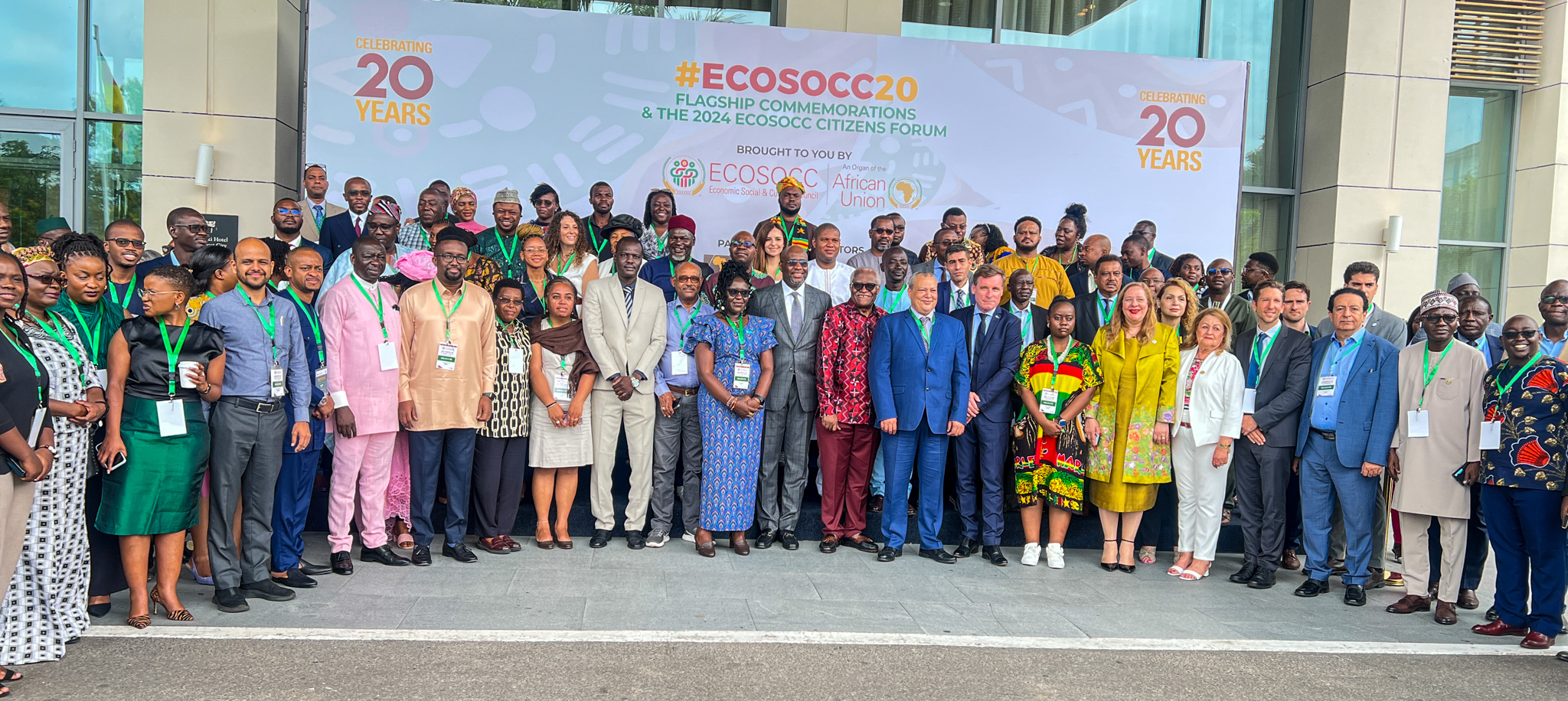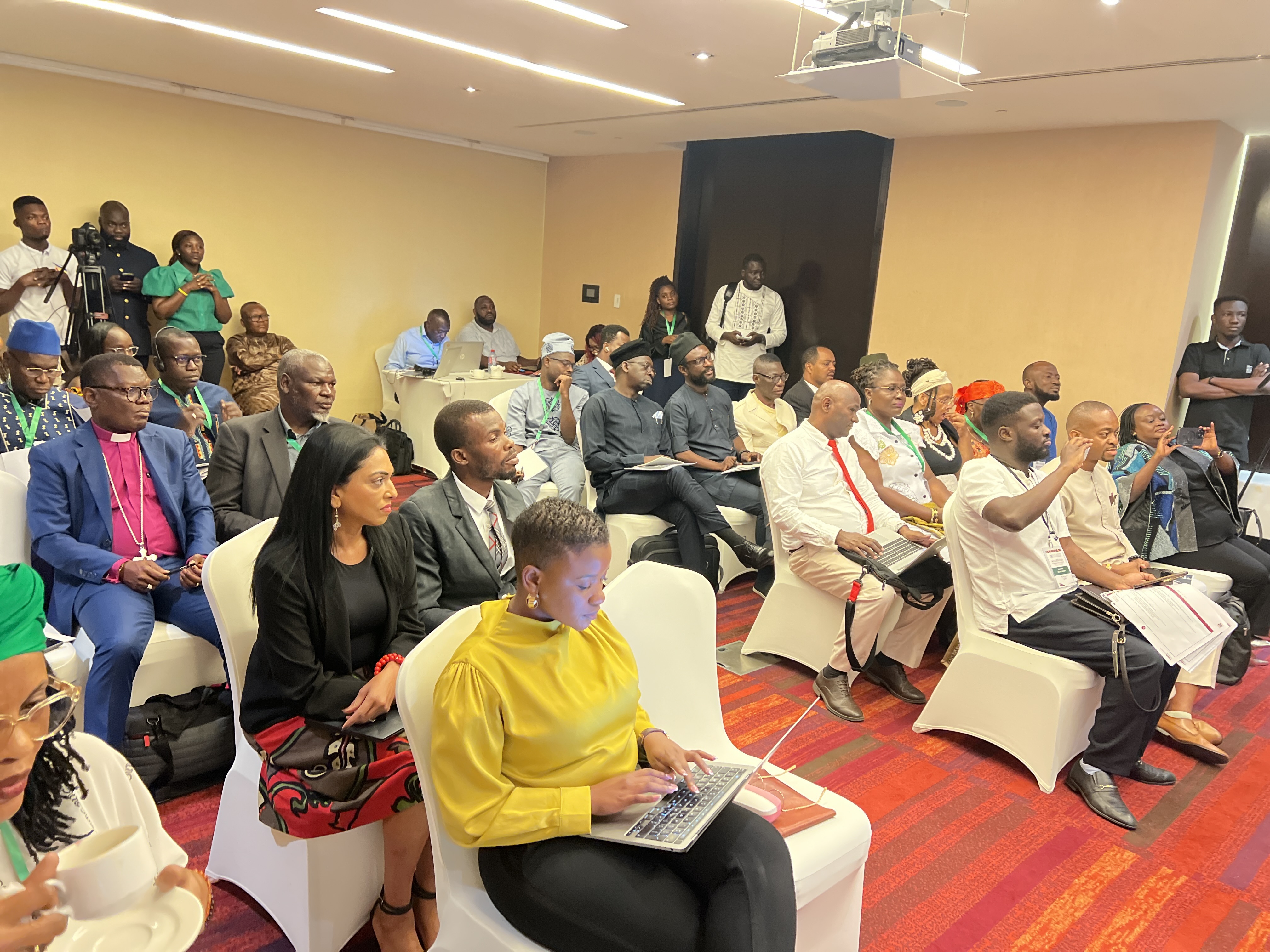
On July 19, 2024, the Kempinski Hotel in Accra, Ghana, became the center of a vital initiative to safeguard democracy in West Africa. On the margins of the African Union (AU) ECOSOCC @20 celebrations, a breakout session took place. The session was designed to share experiences from West African civil society engagements in preventing and responding to Unconstitutional Changes of Government (UCG) in the region: Moving from Recommendations to Implementation Actions to consolidate democracy across the Economic Community of West African States (ECOWAS) member states.
Organized by the Regional Citizen’s Dialogue Programme (RCDP) consortium, the experience-sharing session brought together a diverse group of stakeholders—civil society leaders, international partners from the West Africa region and beyond—marking an essential stepping stone in transforming thoughtful recommendations into tangible actions. The session marked a significant moment of participants’ reflection on efforts being made in the ongoing struggle to address political instability and unconstitutional power shifts.
Discussions were enriched with experiences and case studies on promoting constitutional order and state legitimacy in West Africa by the West Africa Democracy Solidarity Network (WADEMOS) and ONG Open, based in Mali, with a particular focus on countries in political transition in the Sahel, those that have conducted or are about to conduct national elections, and those engaged in national constitutional review processes.

Various speakers at the session stressed that the role of civil society is crucial in preventing UCGs. Through the RCDP platform, monitoring and reporting on incidences related to UCGs can be constantly undertaken. Joint actions and recommendations can be made to reinforce regional and national efforts. Organizing regional dialogues and forums to discuss UCGs, engaging youth, diaspora, and marginalized groups, and providing platforms for accountability are critical actions that need to be taken in our efforts to prevent UCGs. In addition, advocacy and awareness campaigns are essential to promote peaceful and democratic transitions of power. Through the platform, building strong networks to share best practices, collaborating with religious groups and media outlets to amplify messages, and engaging the diaspora to mobilize international support for democratic processes were highlighted as essential strategies.
Strengthening Constitutional Order and the Judiciary Systems
Discussions highlighted the importance of comprehensive national constitutional review processes that ensure constitutions enshrine democratic principles such as the separation of powers, checks and balances, and the limitation of presidential terms. The formation of normative frameworks should include broad public consultations to reflect the collective will of the people. The independence of the judiciary was also identified as crucial. Recommendations included appointing judges based on merit rather than political affiliation, ensuring adequate funding for the judiciary, and protecting judges from intimidation and harassment. These measures are essential to uphold the rule of law and prevent judicial manipulation by political elites.
Public education emerged as a key topic as well. Integrating constitutional literacy programs into school curricula and organizing public awareness campaigns were seen as vital steps. Making constitutions accessible to citizens in local languages and through online platforms would enhance public understanding and engagement with the democratic process.
Addressing Root Causes
The session recognized the necessity of addressing the root causes of political instability to effectively prevent UCGs. Inclusive economic development was identified as a critical strategy. Diversifying economies to reduce dependency on natural resources, prioritizing investments in education, healthcare, and social welfare programs, and promoting inclusive growth were highlighted as essential steps toward economic stability and social cohesion.
The need to address social inequalities and ethnic tensions is crucial, and proposals included dialogue and reconciliation programs to foster open and inclusive discussions between different ethnic and social groups. Supporting initiatives that promote social cohesion and address historical grievances would help foster a national identity that transcends ethnic and regional divisions.
Combating corruption was another major focus. Strengthening anti-corruption laws and institutions, protecting whistleblowers, and holding corrupt officials accountable through fair and transparent judicial processes were seen as vital measures to ensure governmental integrity and public trust.
Regional and Continental Actions
Beyond national measures, the session emphasized the importance of regional and continental efforts to prevent UCGs. Developing and implementing early warning systems to identify potential triggers of UCGs was a key recommendation, with a focus on tying them to existing mechanisms implemented nationally and regionally, such as the Continental Early Warning System, among others. Regular monitoring of political developments, early signs of political tension, and economic and social trends would enable timely interventions.
The capacity of the African Union (AU) Peace and Security Council to respond swiftly to UCGs was also discussed. Providing adequate resources for mediation teams and peacekeeping missions, developing clear guidelines for AU intervention, and strengthening the AU's conflict prevention and mediation capabilities were proposed as necessary steps to bolster regional stability.
Mediation and conflict resolution support were highlighted as crucial elements. Deploying experienced mediators to facilitate dialogue between conflicting parties, offering technical assistance for national peacebuilding strategies, and supporting regional peacebuilding organizations would enhance the region's ability to manage and resolve political crises.
Strategic Partner Involvement
Strategic partners play a crucial role in supporting the region's efforts to prevent UCGs. The session called for the use of diplomatic pressure to deter member states from pursuing unconstitutional actions. Issuing strong public statements, imposing targeted sanctions, and suspending military cooperation or aid programs with governments committing UCGs were recommended as effective measures.
Supporting regional initiatives and institutions that promote democracy and good governance was also discussed. Providing financial and technical assistance to bodies like ECOWAS, supporting the work of AU-ECOSOCC, and collaborating with regional leaders to develop a collective approach to preventing UCGs were seen as vital steps.
Tying development assistance to democratic reforms and respect for human rights was another key recommendation. Conditioning aid programs on progress in areas such as electoral reforms, anti-corruption measures, and human rights protection, and ensuring that development assistance strengthens democratic institutions and civil society organizations were highlighted as crucial strategies.
Moving Forward
The experience-sharing session concluded with a collective commitment to hold further consultations with key stakeholders to refine and implement follow-up actions, including seeking support for advocacy, media campaigns, monitoring, and reporting on ongoing national constitutional review processes in The Gambia, Guinea, and Sierra Leone. It was also recommended that civil society engagement should be intensified in countries preparing for national elections, such as Ghana and Guinea-Bissau. At the regional level, RCDP partners should reach out to the ECOWAS Commission to complement the Commission’s efforts in the ongoing final review process of the 2001 ECOWAS Supplementary Protocol on Democracy and Good Governance and to assist where required in the preparation and planning for the Heads of State and Government proposed Special Summit on the “Future of Regional Integration in West Africa, taking into account the State of Governance, Peace, and Security, and the Regional Integration Project.” At the end of the session, participants expressed their willingness and commitment to stand with the citizens of the Sahel states and proposed the organization of a series of consultative engagements and conferences on the current peace, security, and humanitarian situation in Burkina Faso, Mali, and Niger, with the primary aim of mobilizing regional solidarity support for our “brothers and sisters” in these member states. Civil society in the region stands ready to engage in mediation support missions if called upon.
The event marked a significant step forward in the journey from recommendations to actionable steps with the goal of fostering a stable, democratic West Africa. The path ahead is challenging, but with unified efforts and a clear roadmap, the vision of a region free from unconstitutional changes of government is within reach.
About RCDP Initiative for West Africa
The RCDP initiative, launched in February 2024, is designed to mobilize and coordinate civil societies' efforts towards the prevention and mitigation of UCGs in West Africa, in line with the decisions and recommendations from the AU Accra Declaration on UCG in Africa (March 2022), the Malabo Declaration on Terrorism and UCG in Africa, the APRM report on UCG, and the AU ECOSOCC First Citizen’s Dialogue Forum on UCG in Africa